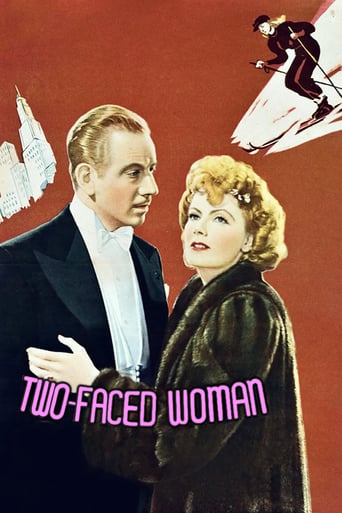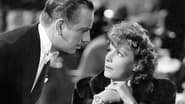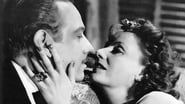SimonJack
The title of this movie, "Two-Faced Woman," might just as well be labeled "Two-Faced Man." Greta Garbo gets all dolled up from her outdoors skiing persona to become a New York glamor puss, all in the interest of pursuing her husband. She gets passed off as a twin sister, wherein most of the comedy of this film lies. Melvyn Douglas is her recent husband of a very short whirlwind romance on the ski slopes somewhere out West. But he has returned to the daily grind as a magazine impresario in the Big Apple. Although he fell for the attractive ski instructor hook, line and sinker, he can't tear himself away from the excitement of his big city persona. He's addicted to work, glamor and recognition.Garbo plays Karin Borg and her would-be twin sister Katherine, and Douglas plays Larry Blake. Some great laughs are provided by the supporting cast, especially Constance Bennett as Griselda Vaughn, and Roland Young as O.O. Miller.While this is an entertaining piece, it's not a very sharp or witty script. It's a weak story and the screenplay is choppy in places. It's not among the best work of either Garbo or Douglas. They had made three movies together, this being their last. The film bombed at the box office and turned out to be Garbo's last movie. She quit films and retired to New York where she became a favorite of among the jet set for many years. She never married and died in New York at age 84 in 1990. She was buried in her native Stockholm, Sweden.Garbo never won any major honors in her career, just short of 20 years. But she received several nominations including three Oscar nominations. The Academy Awards gave her an honorary award in 1954 for her unforgettable screen performances. Who could ever forget her In "Grand Hotel" (1932), "Anna Karenina" (1935), "Queen Christina" (1933) or "Camille" (1936)? And, she was the essence and embodiment of excellent comedy in "Ninotchka" of 1939. I think that may be the best satire ever put on film. Douglas was her co-star in that smashing success.Interestingly, Douglas never won an award or even received a nomination during these golden years of Hollywood. But he kept his career alive and won several awards in the 1960s to 1980, including two Oscars.A little added enjoyment is a couple of skiing scenes early and late in the film. A very good skier did some excellent stunt skiing as Douglas's character. Garbo and Douglas fans should enjoy this movie as a light sample of their comedy work. Others may find it so-so.
FlushingCaps
This was Greta Garbo's last film, released in early 1942, co-starring Melvin Douglas. I viewed it this afternoon on DVD from a recent airing on TCM.We open with Douglas as Larry Blake, magazine publisher, vacationing at an Idaho ski lodge, telling the lodge manager that he has no interest at all in skiing. Seeing, Garbo, as Karin Borg, skiing expertly right outside the window, he decides, upon hearing she is a ski instructor, to pay for private lessons, taking her immediately away from a class of several she was teaching. He annoys her by immediately suggesting they go someplace private—letting it be clear that he is interested in anything other than skiing.Karin's response is to take him to the top of the mountain, which is something I believe few ski instructors would do because a novice on a really steep slope would be extremely dangerous. After getting off the chair lift, he almost immediately starts going down backwards and falls over a ridge and we see skis and legs sticking out from a pile of snow beneath the edge of the ridge.The next scene has two of Larry's colleagues, O.O. Miller (Roland Young) and Miss Ruth Ellis (Ruth Gordon) rushing to the lodge, worried about their missing boss. Then we see Larry entering a private cabin with Karin and learn they are newly married. Larry says he plans to immediately retire and stay there with Karin, living a simple life. By morning, he's changed his mind no fewer than three times, and leaves his new wife to return to work. She resisted his orders to go with him, as that isn't what they agreed to. To me, this proves why it is unwise to marry someone you don't even know.After many weeks of broken plans for him to come back to her she decides to go to New York and surprise him. But on seeing him friendly with an old girlfriend, Griselda (Constance Bennett) Karin decides to go back to Idaho without seeing him. Spotted by O.O., she goes along with Miss Ellis' concoction and pretends to be her own twin sister, Katherine, a fictional person.She decides her husband needs to be spied on and maneuvers herself to be with him, as she is "dating" O.O. in the role of Katherine Borg. Almost immediately, we see that Larry is at least 90% sure that this is really his wife. Whether he is just flirting with Griselda or having an affair is left uncertain. It is certain that Griselda has romantic plans for Larry.Most of the film settles into this deception mode. Karin, as Katherine, in scenes we never saw, apparently got two suitors, including O.O. believing she they were engaged to her. Mostly she tries to make a play for Larry, wanting him to dislike her "city" ways so he'll go back to Karin. At one point she directly tells him to go to Karin, but he insists he is more interested in her.They wind up back in Idaho and Larry has a terrible time skiing down the mountain, falling and getting up over and over (something only an expert skier could do), as Karin skis down trying to help him stop. He winds up in a lake and suddenly their problems are over as the movie ends.If the review sounds ridiculous, that's the way the movie was. There were few scenes supposed to be funny, but it was too lighthearted to be a good drama. Even a supposed screwball comedy has to have some measure of believability in the script. We were never given anything other than lust to explain why these two got together—they had absolutely nothing in common and we never got any scene, like most "romantic" films where they dated and did something together that made them both laugh together happily. Just—BAM—these strangers are married. And Larry is more interested in his magazine than his wife on his wedding night? For him to go back to New York for a few days to fix a problem is fine. But as shown, it was many weeks he stayed there ignoring her. Annulment time in the real world. No need for a divorce here.What Karin sought to accomplish with her deception is rather dumb as well. She is supposed to make him want to go back to Karin by being a city girl who parties too much and drinks and such. But his world has been the big city and it makes no sense that he would yearn for the new life he, sort of, planned to have with his new bride.This might have worked better if the couple had been married for a few years and she finally talked him into giving up his magazine to retire to the ski lodge, and to help out in a crisis, he went back to the city to rescue the magazine and left her for days or a week, not a couple of months. I know, I'd be changing most of the script, but it needed drastic changing to make a good film. A "4" is a generous score.
blanche-2
Screen icon Greta Garbo was nearing the age of 36 when she began filming "Two-Faced Woman," a comedy also starring Melvyn Douglas, Constance Bennett, Roland Young, and Ruth Gordon. The world was changing, and it was time for her to come off of her queenly throne, get out of those huge Adrian costumes, and join the land of the common people. Back in those days, when an actress hit the 30-35 range, she was considered over the hill. Crawford was shown the door by Louis B., Norma Shearer smartly retired, and Garbo's costar in this movie, Constance Bennett, at 37 was playing supporting roles after years of stardom.So in fact, Garbo's days at MGM were probably numbered as the studio sought to find her a new image. Unfortunately, her new image - in a light, fluffy comedy - coincided with the entrance of the U.S. into World War II. Everyone was too distracted to care, including Garbo, who wanted to go home to Sweden.I come at this film with a slightly different perspective, having transcribed hundreds of hours of Garbo's phone conversations with art dealer Sam Greene for the book "Garbo" by Barry Paris. Any exposure to Garbo the woman is enough to realize that she was a remarkable artist. Though a neurotic, passive, and frightened woman, her beauty and vivid imagination, born of isolation, made her a tremendous star and a great, expressive actress.In "Two-Faced Woman," Garbo plays a dual role, that of a nature-loving ski instructor, Karin, who marries a guest (Melvyn Douglas) at the lodge where she works, and the twin sister whose existence she fakes, the globe-trotting party girl Katherine. Katherine is invented when Karin comes to New York and sees her new husband with his former girlfriend (Bennett)."Two-Faced Woman" isn't a great movie - it's pleasant enough, and the cast is terrific, but it suffers from bad timing and the fact that this was such a departure for Garbo. Many people didn't feel it was a particularly successful one. She actually is quite good, particularly in the nightclub scene when she dances the chica-choca, a dance Katherine makes up when her shoe catches in the hem of her dress. In real life, whenever the dance instructor arrived at Garbo's house to give her lessons, the curtains were drawn. Knocking at the door, he would hear Garbo yell, "Go away, rumba! Go away!" Nevertheless, she acquits herself delightfully throughout the scene, culminating with the dance. The other thing that is marvelous in the film is the wild skiing scene at the end - absolutely tremendous, and I'm surprised it didn't kill the stunt double.The film was controversial because the character of Larry seduces a woman he thinks is his sister-in-law, so the script was changed to be more acceptable. A scene was inserted where Larry calls the ski lodge and learns that Karin is out of town. Realizing Katherine is Karin, he plays along, turning the tables on her. It seems like a silly change now."Two-Faced Woman" was not the flop the years have built it up to be; in fact, it made back 5 times its budget. And it's highly unlikely it ended Greta Garbo's career. Had things worked out, she would have returned to films after the war - in fact, she almost did. But when the funding for the proposed film fell through, she was embarrassed, humiliated, and being the kind of woman she was, never took a chance to be put in such a position again. Garbo was part of a world that ended when the bombs started dropping, and she didn't find her place in the one that emerged.
ccthemovieman-1
The story is a little slow and a little stupid. Greta Garbo doesn't look very good and I couldn't understand half the things she said because of her accent, which was exaggerated for this role. Melvyn Douglas, meanwhile, plays his normal unlikeable role and Constance Bennett is just so-so except for a couple of her screams, which were funny. On the plus side, Roland Young had the best role in the film. I wish he had more lines, as he disappeared in the second half of the story. Also, it was interesting to see Ruth Gordon look so young. I had only seen her in those crazy roles she played from the late '60s to the '80s and a whacked out old woman. Story-wise, the best part might have been the final few minutes when we see a stunt man doing amazing things on skis, pretending to be Douglas falling down the slopes. That was amazing and humorous footage.Overall, I can see where this film - Garbo's last - was not a box-office success. It just drags too much, going on and on about deceptions. It's an annoying story. Garbo knew it, too, and called it quits.





